The host country of the great Frankfurt book fair, the small Caucasus Republic of Georgia is this year. Open and honest you want to be, their history and, of course, their literature.
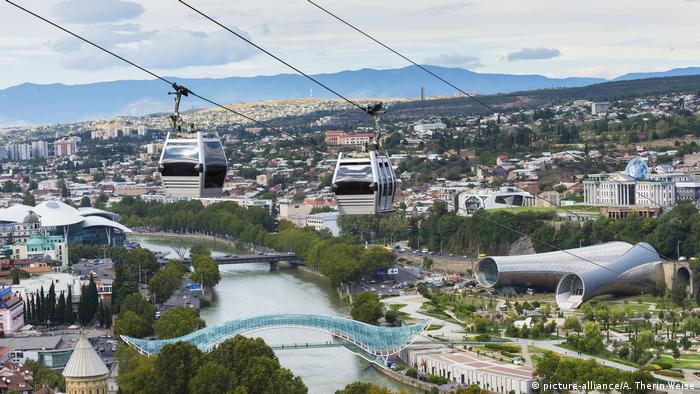
The geographical proximity to the Orient in Tbilisi, it is hardly noticeable. In fact, Georgia’s capital, is a European metropolis, vital, and of a strange beauty. On both sides of the Mtkvari river, it has spread over the centuries, the terraces of the hills and slopes. In addition, the massive fortress perched Narikala. Merchants, bankers, and well-traveled craftsmen have the centre of the city in the 19th century. Century, transformed into a citizen of the city, with wide streets and lush city residences. The old city centre, but by pulling up today, cobbled streets. Scaffoldings everywhere. The typical, ornate balconies of the houses to be sustainably restored. Tbilisi disposed of the crumbling dirt of the Soviet time.
Troubled Past
Davit Gabunia, award-winning Georgian playwright and critic, followed the changes of the city, the country and its inhabitants carefully. Where is the young Republic – after decades of Soviet occupation? And how are they dealing with their past?
“I think,” says Gabunia, “that we still need to experience several years of stability and peace and economic recovery, before we begin to deal with our past.”
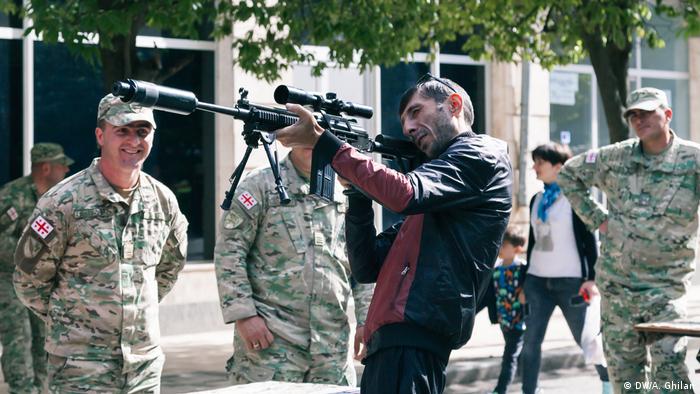
Many Georgians hold a military training is important – you still remember the Russian tanks in Ossetia in 2008 because of the war with the breakaway province of South to Tbilisi.
The past of Georgia, the centuries of foreign rule, exploitation and oppression. The past, the Stalin’s system of Injustice, Soviet Propaganda, and finally the difficult time after the independence in 1991: unstable power relations, one lying on the ground of economy, corruption and violence, and the struggle for the breakaway republics of Abkhazia and South Ossetia.
This overheated and permanently tense political Situation, says Davit Gabunia, have engaged people so much that no one engage in peace with the past. “Although the roots of all problems are to be found.”
Davit Gabunia: “colors of the night” – play, before the explosive backdrop
Therefore, the literature of Georgia is so insightful. Because it sweeps by the small country and its history, told by the people, and looks fearlessly into abysses and breaks.
“Colors of the night” is the title of Davit Gabunias first novel, recently published in English: a cleverly-constructed chamber drama, a Thriller and a snapshot of the Georgian society in which homosexuality is taboo, Machismo is prevalent and everyone seems to be on the next.

Typical yard of a house in Tbilisi
In the house opposite, a man has been killed. Zurab has seen from his apartment. Because every night, he stood on the balcony and looked to the new neighbour and his older lover. Now the pretty Boy is dead. And Zurab. He wants to finally have a Job again and know how he can get.
Davit Gabunia has placed this Drama in the late summer of the year 2012; the then-current political events serve as a backdrop: In the October 2012 parliamentary elections are to take place. Many Georgians are unhappy with the increasingly authoritarian style of government of President Mikhail Saakashvili, however, polls still see him in the summer as a clear choice winner.
Rebellion and awakening
Then Videos showing that in Georgia’s prisons being tortured circulate in the media. Tens of thousands take to the streets. The country threatens to explode.
On 1. October, the change of power. The Oligarch and billionaire Bidzina Ivanishvili becomes Prime Minister, he reaffirms a pro-Western course. A year later, he withdraws voluntarily, he is up to today. His residence: a glass Palace, high above Tbilisi, designed by the Japanese star architect Shin Takamatsu.
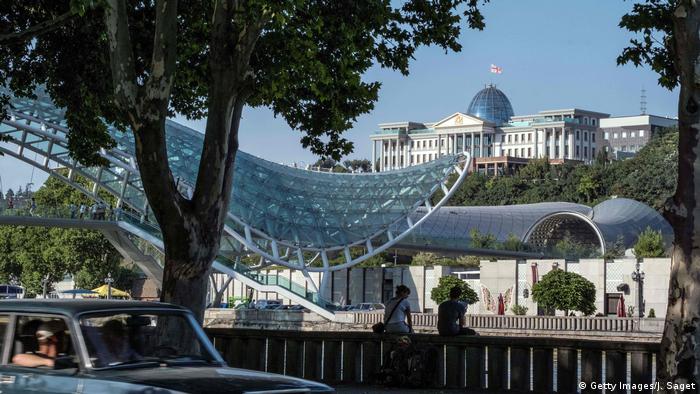
The centre of Power – the President of Georgia Palace
The Georgian culture, says Davit Dabunia, is a culture of extremes. He does not like any Extreme. Therefore, his protagonists are ordinary people. But he catapulted in exceptional situations and observed what is happening with you. Absolutely worth reading!
Little points in the city of Tbilisi on the eruptions of the recent past. The total work of art that is alive and constantly in motion. Monotony reigns rather in the outskirts.
Nana Ekvtimishvili: “The pear field,” violence sows the seeds of violence
Nana Ekvtimishvili grew up beyond the city limits, in a village near Tbilisi, in close proximity to a children’s home – a relic from Soviet times. Children nobody wanted, grew up here, in abject poverty – dirty, abused,brutalized. “Moronic” as you disparagingly and with violence, in turn violence in them sown.
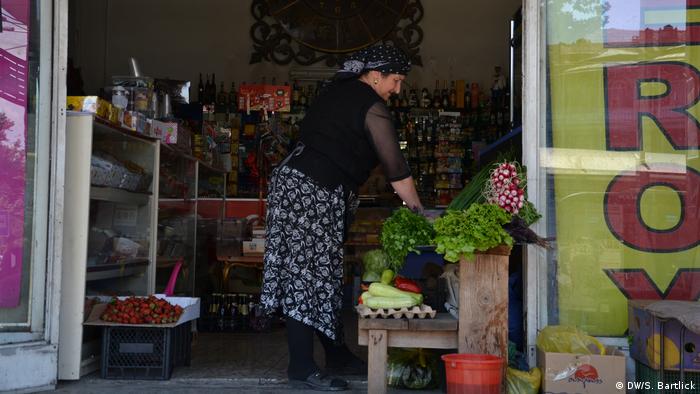
Georgia women since independence, they contribute to the livelihood.
Nana Ekvtimishvili has played as a child with these children in the home, also has heard you laughing from the Ritual in the bulb field have told. That girls who had newly come into the home, were raped by other children. Your childhood memories processed by a good 20 years later, in a disturbing novel, after she has seen former playmates randomly – begging on the street.
Strong Women
The Unloved, the Damaged, it has to be given a voice, and with the young Leila is a strong female protagonist created, the fights furiously against all the humiliations.
In Western Europe, has made Nana Ekvtimishvili so far, especially as a filmmaker with a name. She studied law in Potsdam, but the stories you told, playing in Georgia. And always women are the focus. Women, the grab, the changes want. The worst and most insidious, what was left of the Soviet Union, says Nana Ekvtimishvili, was not that the people are analyzed: “That the people have not learned the reality, and believe I could change. Because people have not learned to change something with your own hands.”
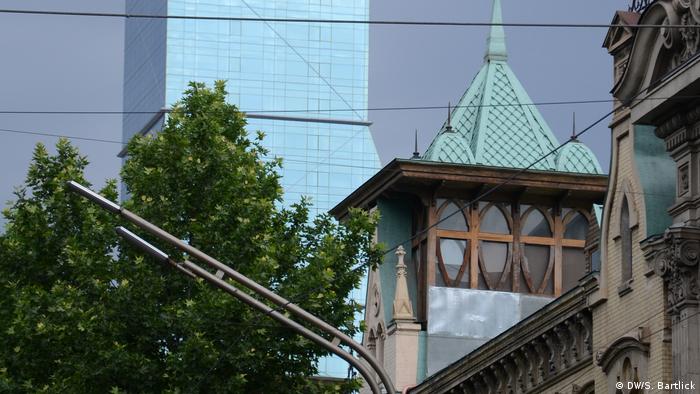
Tbilisi – a lively mixture of old and modern architecture
Archil Kikodze: “The Südelefant” – story of an identity crisis
What will the future bring? And all have their place in it? The writer, photographer, actor, and travel guides, Archil Kikodze is a lot in the country and in Tbilisi. A Wanderer between the worlds, a thoughtful observer. His novel “The Südelefant”, in Georgia, has already won several awards and is now translated into German, leads the I-narrator for a day in Tbilisi and in numerous flashbacks to the 1920s. The story of an identity crisis, Archil Kikodze told, is full of ethical conflicts, and questions about the right or wrong of life, for truth and truthfulness.
The time, in the Georgia part of the Soviet Union was, he says, have damaged the company. The traces she has left in everyone’s family history. Therefore, his Protagonist is the way he is, the son of a corrupt boss of the Soviet shadow economy and an educated middle-class Georgian. “I gave him this heavy heritage, he must wear all his life, and he will have to fight,” declared Archil Kikodze.
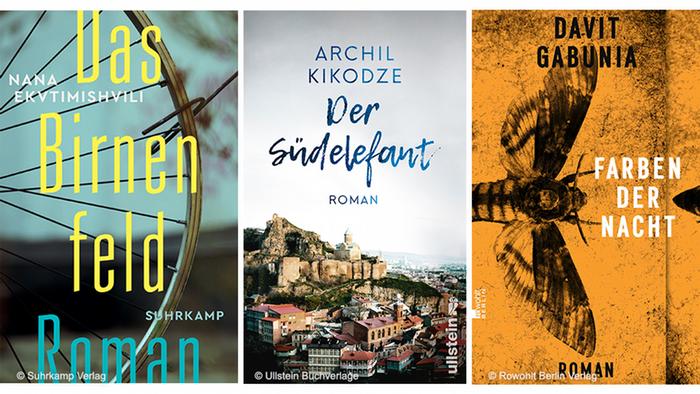
Three of the many worthwhile novels from Georgia
With Power to the West
“The Südelefant,” he says, this is the story of his Generation. Once, after a reading, came a young girl to him and I thanked. Now you understand why your uncle drink so much. And why your neighbor is the way he is. If it is to remain peaceful in Georgia, says Archil Kikodze, then the society will develop in a step-by-step. The young people were different, more open, colorful, free. “But my Generation has many Complexes that we carry our whole lives with us.”
Today, Georgia strives to the West. English has replaced Russian as the first foreign language in the EU you can travel without a visa. Georgia, a country in transition. Its literature – a discovery!
Davit Gabunia: colors of the night, Rowohlt, 192 pages.
Nana Ekvtimishvili: The Bulb Field, University Of Chicago Press, 221 Pages
Archil Kikodze: The Südelefant, Ullstein, 272 Pages

